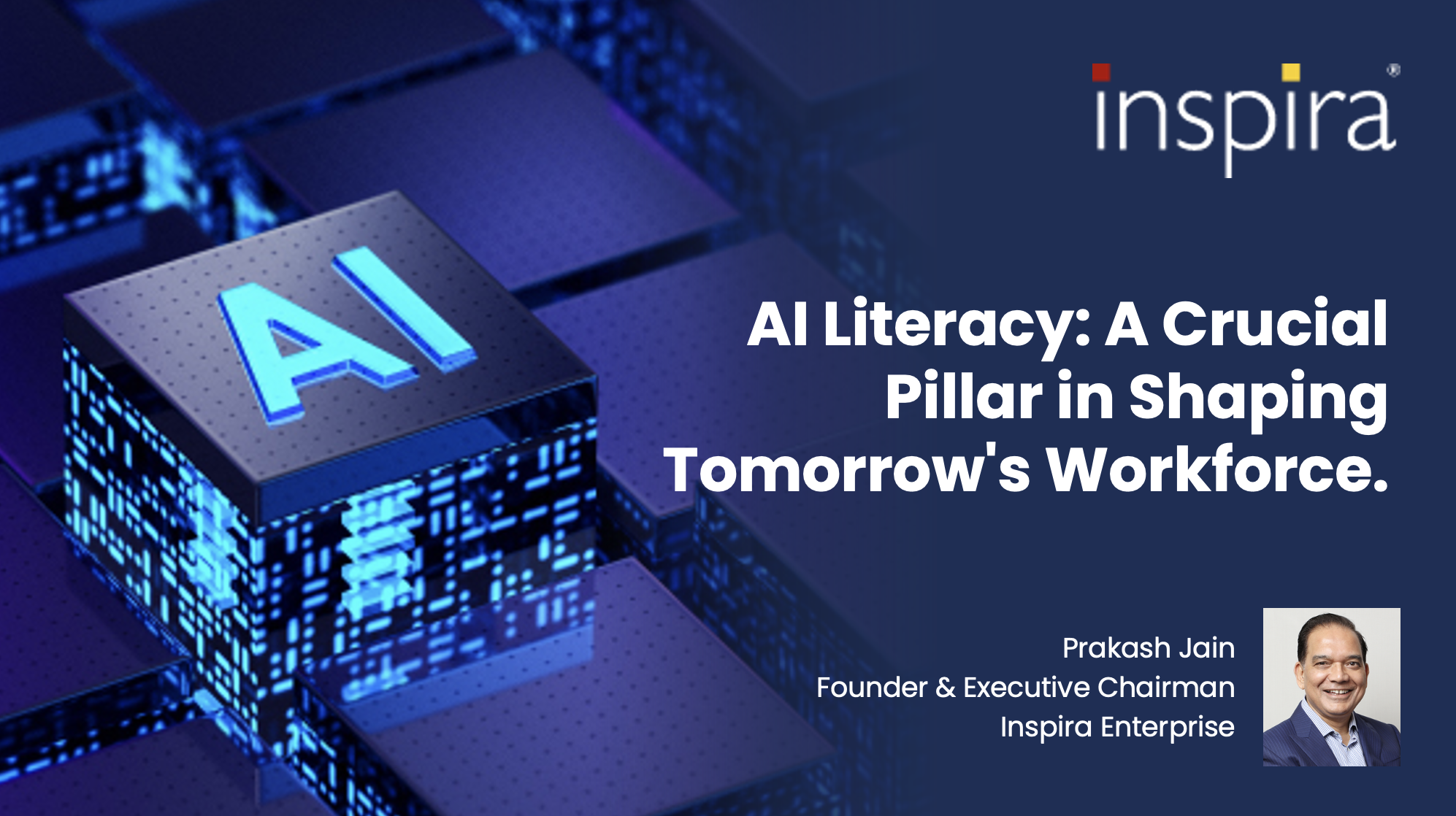AI Literacy: A Crucial Pillar in Shaping Tomorrow’s Workforce - Prakash Jain, Executive Director & Chairman, Inspira Enterprise

Artificial Intelligence has moved from science fiction to reality, reshaping industries like financial services, healthcare, agriculture, and manufacturing. From predictive maintenance to personalized shopping, AI is transforming how businesses operate. Leaders are exploring AI’s potential, with many already implementing solutions and envisioning a future of human-AI collaboration. This shift is driving demand for AI skills and pushing companies to reskill their workforce.
AI talent gap in India’s education sector
Nasscom projects that
AI could add USD 500 billion to India’s GVA by FY2026, though AI adoption in
India faces a 50% talent gap compared to the US. As AI integration grows,
mastering these technologies is becoming essential for the workforce.
As AI technologies
advance and expand across various professions, it will be crucial for today’s
students in India to acquire skills that complement and enhance their
understanding of AI, offering value that goes beyond what these technologies
can provide.
With the growing demand for AI and data science, the Ministry of Electronics and Information Technology plans to integrate AI courses into the education system starting from Class 6, where a comprehensive curriculum is developed under the ‘National Programme on Artificial Intelligence Skilling Framework’. In recent years, AI courses have been incorporated into the curriculum of Indian universities too. An AI curriculum should prioritize practical training, supported by industry-academia collaboration, to ensure the workforce aligns with the changing demands of the job market.
AI literacy in today’s workplace
AI literacy, which also
involves a comprehensive understanding of how AI works, its potential
applications, and its societal impact, is as crucial as the technical skills
required to develop AI systems. AI-related expertise spans not only hard skills
like machine learning, deep learning, and data science but also essential
competencies such as digital fluency, critical thinking, and
problem-solving. Equally important is
addressing the ethical implications of AI on jobs and related concerns. The
workforce must also cultivate a deep awareness of AI's evolving capabilities
and potential future impact.
According to the Observer Research Foundation, India’s workforce is exceptionally positioned to leverage the AI revolution, particularly in technical skills. India has the highest relative AI skills penetration, with Indians being three times more likely to use generative AI than other nationalities, contributing to one of the fastest-growing talent pools globally.
AI literacy matters for today’s and future workforce
As AI becomes
increasingly pervasive, enhancing productivity and innovation across
industries, AI literacy becomes a key factor in improving employability.
Understanding AI can facilitate collaboration across various business units,
bridging the gap between technical and non-technical employees. Employees proficient in AI can leverage this
technology to enhance operational efficiency by automating routine tasks. This
not only boosts productivity but also optimizes costs for the organization.
AI literacy also
fosters a culture of innovation, enabling employees to work alongside AI to
create new revenue streams and business models. It helps eliminate mistrust of
AI, allowing for harmonious collaboration between humans and machines.
Moreover, AI-literate employees are better equipped to recognize the risks
associated with AI, ensuring the technology is used responsibly and ethically,
with a strong emphasis on transparency.
Finally, AI literacy encourages a mindset of lifelong learning, motivating employees to continuously update their skills and remain relevant in an ever-evolving technological landscape.
Building AI literacy for the future
As AI continues to shape our work and daily lives, it is imperative to responsibly integrate AI literacy into educational systems, making it a core component of curricula across all levels of learning. This integration should start as early as primary education and extend through secondary education, higher education, and professional courses. By embedding AI concepts into school curricula from a young age, students will gain a well-rounded understanding of the technology, including its vast potential and inherent limitations.
Emphasizing safety, transparency, and ethical considerations is essential when integrating AI technologies into education. Educational institutions should prioritize the adoption of best practices that promote responsible AI usage and safeguard against potential risks. Fostering AI literacy requires a collaborative effort between educational institutions, industry, and government. By forming strategic partnerships, these stakeholders can create a comprehensive AI education ecosystem that supports lifelong learning and prepares students for the demands of a rapidly evolving, technology-driven world.
Precedence Research
projects the global AI market, valued at USD 538.13 billion in 2023, to grow to
USD 638.23 billion in 2024 and reach USD 3680.47 billion by 2034. In today’s
data-driven world, AI literacy is a crucial skill for success, empowering individuals
and future generations to thrive. As
India aims to become a global AI hub, ensuring the technology remains ethical
and inclusive is essential. Public-private partnerships (PPP) can help bridge
the gap between innovation and responsibility. While India’s AI future is
promising, challenges like regional disparities in AI skills and infrastructure
must be addressed for the country to emerge as a global leader in AI.



